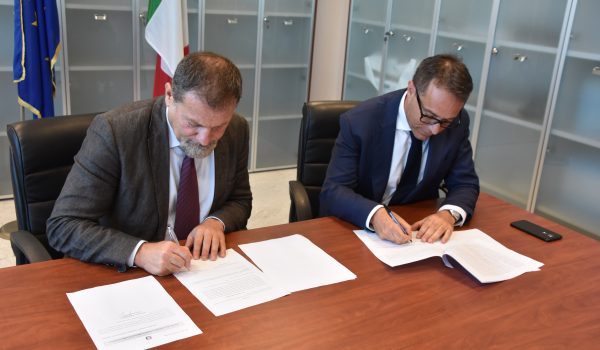A pilot model for combatting the criminal phenomenon of looting archaeological sites and trafficking artefacts and artworks is the fundamental objective that underlies the institutional collaboration between the Archaeological Park of Pompeii and the Public Prosecutor’s Office of Torre Annunziata, which has already enjoyed success, with the signing of a Memorandum of Understanding between the two entities.
On Thursday 1st August 2019 at the Public Prosecutor’s Office of Torre Annunziata, the Assistant Public Prosecutor, Pierpaolo Filippelli and the Director General, Massimo Osanna signed the Memorandum and illustrated the various points and reciprocal commitments, of the Park and the Public Prosecutor’s Office, which lie at basis of the agreement.
The area which is under the jurisdiction of the Archaeological Park of Pompeii, and in particular the suburban area where various settlements (including several villas and necropoli) are present and whose protection also falls within the jurisdictional objectives of the Prosecutor’s Office, has been the victim of various episodes of theft and damage over the years.
The purpose of the Memorandum lies in the activation of a constant and rapid channel for exchanging information, news and the implementation of shared procedures, in respect of reciprocal duties and competences, which ultimately seeks to interrupt criminal acts and halt the (often repeated) looting of archaeological sites, as well as prevent its continuation.
The effective joint operation which has taken place over the last few years, that has involved both the Park and the Prosecutor’s Office, along with investigators from the Carabinieri Command Group of Torre Annunziata and the Cultural Heritage Protection Unit of Naples, in the protection of archaeological heritage that is at risk in the suburban area of Civita Giuliana (in the northern area outside the walls of the archaeological site of Pompeii) - which has been targeted by clandestine tunnels - has highlighted the importance of formalising the good operational practices which have been established, in order to create a model which can be applied to other contexts.
In that case the Prosecutor’s Office, which had been aware of the illegal activities of grave robbers for some time, had requested the Archaeological Park to conduct a full excavation for the gathering of evidence, which among other things led to the discovery of both rooms from a sumptuous suburban villa and important archaeological and scientific finds.
Among the main points of agreement:
The Prosecutor’s Office will undertake to promptly and formally communicate to the Park all the information in its possession relating to illegal activities in the areas of competence, and in such a case to request the carrying out of archaeological probes or full excavations. Authorisation will be given for the presence on site of officers from the Judicial Police, who are authorised to inspect tunnels and confiscate the objects and instruments of crime, as well as view the discovered finds, which will be entrusted to the Park for custodial purposes.
The Park, for its part, will undertake to activate, if requested, urgent procedures to begin the relative excavations in the area of investigative interest. The excavations, as well as ensuring compliance with all standards of scientific investigation, will assist in providing all evidence of illegal activity, which will be useful to the investigations.
Furthermore, it must periodically provide an updated archaeological map of the relevant area, with indications of the unexplored areas of interest subdivided by typology (necropoli, suburban villas and infrastructural monuments etc.), any excavations which have been legally conducted and subsequently filled in, and any prior illegal excavations which have been reported.
The Park shall additionally undertake to provide a detailed list of stolen cultural goods, including those which according to various sources are currently located in foreign territory, in order to grant a complete and updated perspective of the phenomenon and to better direct investigations.
The Memorandum shall be valid for two years, with the possibility of renewal.


